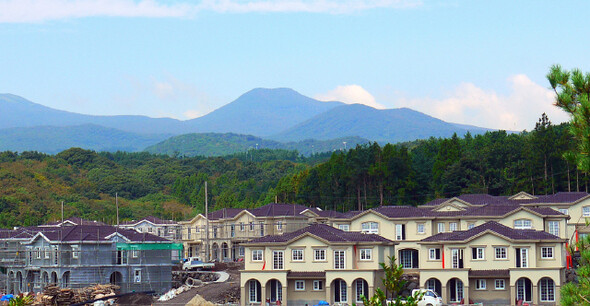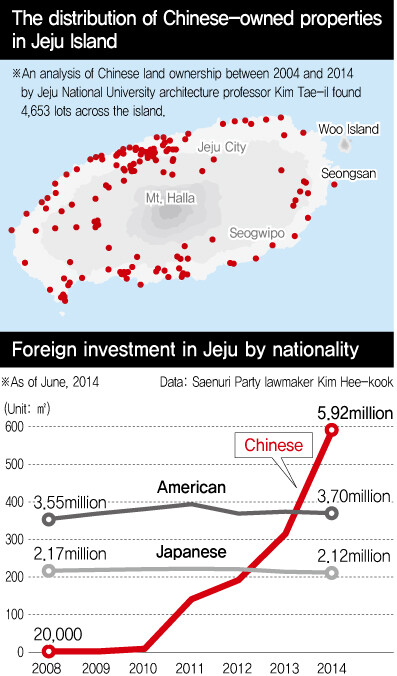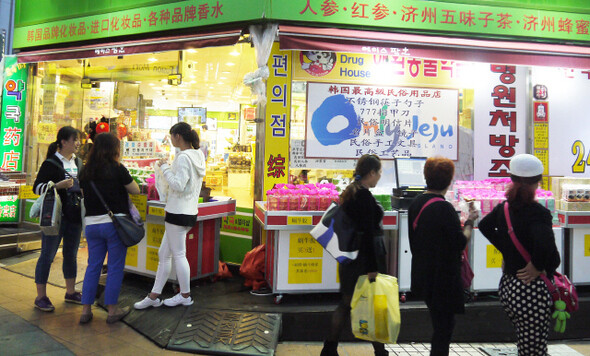hankyoreh
Links to other country sites 다른 나라 사이트 링크
[Special report] Chinese investment is taking over Jeju Island

By Huh Ho-joon, Jeju correspondent
From iconic Mt. Halla to its beaches and cafes, Jeju Island has been thronged by Chinese tourists recently. In the five years since 2009, the amount of land bought by Chinese nationals has soared by nearly 300 times. Meanwhile, the building of tourism and recreation facilities all over the island by Chinese real estate developers continues to raise concerns about eyesores and environmental damage. Can a middle ground be found where both Chinese businesses and the local community benefit?New Jeju Baoren Road, a thoroughfare in new Jeju City, was bustling with groups of Chinese tourists carrying cameras and shopping bags when a Hankyoreh reporter visited on the afternoon of Sept. 28. Restaurants and cosmetics stores were posted with signs in Chinese and photographs of Korean Wave stars. A number of them had Mandarin-speaking employees providing explanations to the tourists. The road was once a popular haunt for university students, but the provincial government changed its name in 2011 in honor of a visit by 12,000 employees of China’s Baoren Group. Now it sees so much traffic from Chinese visitors that it is fast transforming into the island’s own Chinatown.
Three hundred meters away, the area around the Shilla Duty Free Shop was rendered nearly impassable by all the Chinese visitors. Tourists from China also account for a large portion of the hikers on Mt. Halla. So many of the visitors to Seongsan Sunrise Peak were Chinese that it could easily be confused for a famous tourist destination back home. While tourism may be booming, the Chinese purchasing boom in Jeju real estate is growing equally fast.

According to data supplied by the province to Kim Hee-kook, a Saenuri Party lawmaker for Daegu’s South Central District, Chinese land ownership in Jeju increased from 19,702 ㎡ in 2009 to 5,922,327 ㎡ as of late June - a difference of more than 296 times. After a real estate investment immigration system went into effect in Feb. 2010, the land acquired by Chinese nationals rose from 70,612 ㎡ that year to hit 1,319,943 ㎡ in 2011, and 1,220,383 ㎡ in 2013. Another 2,772,536 ㎡ was purchased in the first half of 2014 alone. In 2009, total Chinese-owned land on Jeju amounted to 7,608,000 ㎡, or less than 1% of all foreign-owned land. In five years, that rate has rocketed to 43%.
An analysis of Chinese land ownership between 2004 and 2014 by Jeju National University architecture professor Kim Tae-il found holdings across the island. Geographically, most of the purchasing has been in the northwest; administratively, it falls in the newer sections of Jeju City and Seogwipo.
“From our analysis of the individual lots, it looks like individual Chinese buyers have purchased land in the Nohyeong and Yeon-dong neighborhoods of Jeju City,” Kim said.
The tourism boom and land purchasing by Chinese businesspeople are already having consequences.
Around noon on Sept. 26, construction on the Chiiriin Resort was in full swing at the base of Mt. Halla in the village of Wimi, part of Seogwipo’s Namon township. The project is being built by Baitong Xinyuan, a Chinese real estate developer that purchased the 549,000 ㎡ lot for the resort from the village’s farming cooperative. The current plan includes a 461-room resort condominium and a 200-room hotel, with a completion date of 2016.
“The joint farming land wasn’t any use to us, we sold it off five to six years ago for 50,000 to 60,000 won (US$47.30-56.80) per 3.3 ㎡,” explained one of the Wimi residents involved the Baitong Xinyuan sale. “It seemed like a good deal with the market rates at the time, but it‘d go for 150,000 to 200,000 won (US$141.90-189.30) today.”
Around Baoren Road and the Shilla Duty Free Shop, rents have been skyrocketing. One restaurant owner near Baoren Road, a 47-year-old surnamed Ko, said the establishment’s rent jumped 50% from 24 million won (US$22,700) a year to 36 million won (US$34,100) after the building changed owners.
“In some places, it was a 100% increase,” Ko added. “But a lot of people have stayed because they don’t want to lose their investment.”
As rumors continue to spread that notable restaurants and hotels in downtown Jeju City have passed into Chinese hands, businesses have resorted to putting up banners or taking out newspaper ads to clear the air. A roadside banner raised by the Marina Hotel in Yeon-dong announces, “We haven’t sold our hotel.”

Chinese capital investments are currently focused mainly on real estate development, including resort condominiums for sale by unit.
Experts credited the real estate investment immigration system with fanning the development boom. Some also pointed to problems with the investment promotion district system, which helped the immigration system take root. The investment promotion districts were inaugurated in Apr. 2002, with reductions or exemptions granted on national corporate and income taxes, local taxes, and various surcharges for companies investing a certain amount. It was intended to encourage private investment, which has mainly been in real estate development to date. The investment standard for zone designation has been lowered from US$20 million or more in July 2006 to US$5 million today. At 39 of the 44 zones where South Korean overseas businesses have invested to date, the focus has been on hotels and resorts.
The real estate investment immigration system, in effect from Feb. 2010 to Apr. 2018, is aimed at encouraging investment by granting an F-2 residency visa to foreigners investing at least 500 million won (US$473,100) in condos or other resort accommodations, with the possibility of an upgrade to an F-5 permanent residency visa after five years.
As of late August, a total of 1,438 condo units had been sold to Chinese nationals for a total of 960 billion won (US$908.4 million). In all, 768 residency visas have been granted since the first issuance in Oct. 2010, or 98% of the 783 foreigners who received residency visas over that period.
“The problem,” said Kim Tae-il, “is that the investment promotion is focused too much on real estate development. It’s the visa issuance system that makes this kind of development so appealing.”
“But I don’t think that means anything from Jeju Island’s standpoint,” he added.
Song Jae-ho, a professor of tourism development at Jeju National University, was critical of the result.
“When you’re developing and selling properties like a real estate company and then taking off, that’s not tourism development - that’s just real estate development,” he said.
Jeju Gov. Won Hee-ryong also pointed to problems recently, noting a “trend toward real estate purchasing and resort facility sales due to a number of factors, including permanent residency for investors.”
“The oversupply of accommodations runs counter to Jeju’s future value and may hurt investor profits,” he cautioned.
Some critics are also accusing Chinese real estate developers of buying up large lots at bargain prices, developing them, and then selling off the property at high rates. One especially controversial case involved a 2,519,627 ㎡ plot in Seogwipo’s Sinhwa History Park being sold to Chinese investors in Hong Kong - at what critics say were artificially low rates - for the building of a condo, hotel, and theme park by 2018 at a cost of 2,560 billion won (US$2.4 billion).
The group Jeju Participatory Environmental Alliance requested an audit by the Board of Audit and Inspection over discrepancies in the sale price. The agency agreed to the request last month.
“We analyzed data from the Jeju Free International City Development Center, which built Sinhwa History Park, after an information disclosure request in early June, and found that the sales prices would have been 67,354 won (US$63.74) per square meter if calculated by the law [the appraisal price of 58,569 won, plus 8,785 won in profits], but the Development Center’s sales price of 58,630 won (US$55.48) was just 61 won (US$0.058) more than the appraisal price,” the group said at the time of its request.
Meanwhile, another controversy is raging over the environmental damage. The Jeju resort currently being built by Baitong Xinyuan has drawn especially harsh criticisms from environmental groups, as the site is just 700 meters away from the Mt. Halla Nature Reserve. One project in particular, the building of a “New Ocean Town” on 191,950 ㎡ in front of the Saetal and Dongal volcanic cones at Mt. Songak in Seogwipo by the Qingdao-based company Xinhaiyuan, has many crying foul over what they are calling a “privatization of the landscape.” The area under construction includes views of the peak of Mt. Halla, Mt. Sanbang, and Brother Island.
On Sept. 24, a number of environmental groups held a press conference to demand environmental impact assessment procedures for development projects by Teddy Palace Resorts, which is building the Chinese-funded China Teddy resort condos in Seogwipo’s Andeok township.
Some alternatives
There is a consensus among experts that this is the time for a complete overhaul of the real estate investment immigration system and the designation of investment promotion zones.
“The real estate investment immigration system is not creating many jobs or having much of a positive effect, and there’s a high likelihood that it will lead to real estate speculation,” said Kang Yeong-sam, 51, an economics lecturer at KAIST (Korea Advanced Institute of Science and Technology).
Jeju Gov. Won Hee-ryong has said on multiple occasions that he will actively support Chinese investment, provided that it is high-quality investment
“I read this as indicating that Won means to attract companies that are socially responsible and operate according to ethical principles, so that Chinese investment in Jeju will not only lead to profits for the company concerned but will also benefit the local community,” Kang said in regard to Won’s remarks.
“Instead of purchasing the land, these companies should be taking out long-term leases on the land so that Jeju residents can participate in the economic growth as well,” Kim Tae-il suggested.
“At present, it would be preferable for companies that are developing real estate to be excluded from the investment promotion zones. We should be focusing on industries that are likely to create lots of jobs according to the nature of the investment. We ought to be providing lucrative incentives on the condition that companies promise to hire lots of workers, even if they are investing less than 5 billion won,” said An Hyun-joon, secretary-general of the Jeju Participatory Environmental Alliance.
“The real estate investment immigration system is in the interest of residents of the island, and I think that the system should be renewed after the regulation expires in 2018. Currently, the system is in operation throughout the island, but there are discussions about restricting the system to designated complexes in the future. We are currently deliberating with the Ministry of Justice about a proposal that would require applicants to purchase 500 million won worth of local bonds in addition to making an investment of 500 million won,” said Kim Jin-seok, chief of the bureau for international commerce for Jeju.
“We have made up our minds to exclude vacation condominiums from the list of businesses eligible for designation as investment promotion zones, which includes specialty vacation businesses, casinos, and duty-free stores, and to add industries connected with the resources of Jeju Island to the list,” Kim said.
Please direct questions or comments to [english@hani.co.kr]

Editorial・opinion
![[Editorial] Seoul must use tact and diplomacy to check deepening Russia-NK ties [Editorial] Seoul must use tact and diplomacy to check deepening Russia-NK ties](https://flexible.img.hani.co.kr/flexible/normal/500/300/imgdb/original/2024/0614/8417183518068633.jpg) [Editorial] Seoul must use tact and diplomacy to check deepening Russia-NK ties
[Editorial] Seoul must use tact and diplomacy to check deepening Russia-NK ties![[Editorial] Thorough audit, evaluation of oil test drilling are needed [Editorial] Thorough audit, evaluation of oil test drilling are needed](https://flexible.img.hani.co.kr/flexible/normal/500/300/imgdb/original/2024/0610/2017180109432618.jpg) [Editorial] Thorough audit, evaluation of oil test drilling are needed
[Editorial] Thorough audit, evaluation of oil test drilling are needed- [Editorial] Yoon prioritizes his administration over South Korea’s safety once again
- [Column] The monumental shift in N. Korea’s nuclear program that never happened
- [Editorial] Yoon must submit himself to questioning over Marine investigation interference
- [Editorial] Court’s reversal of prosecutor’s impeachment will only embolden his peers
- [Column] How Korea’s restaurant servers went from being called ‘aunties’ to ‘bosses’
- [Column] Samsung’s screwup, Lee Jae-yong’s crisis
- [Column] The growing price of maintaining the president’s ego
- [Column] Taiwan’s new president bucked China’s silent demands for neutrality — now what?
Most viewed articles
- 122 years later, Korean girls killed by US troops remain a symbol of the price of military tensions
- 2S. Korea flouts UN body’s call for reparations for sex-trafficked Filipinas
- 3As Putin visits Pyongyang, Seoul to host Chinese diplomatic, security officials for dialogue
- 4Korea slated to chair ILO executive body, but has long way to go on its own labor policies
- 550 years later, US military still a fixture in Gyeonggi ‘camp towns’
- 6Real-life heroes of “A Taxi Driver” pass away without having reunited
- 7[Reportage] Yoon sits idly by as Japan tears down memorial to Korean forced laborers
- 8[Column] Samsung’s screwup, Lee Jae-yong’s crisis
- 9How making ESG reporting mandatory serves the public and our environment alike
- 10US envoy to S. Korea suggests restraint is needed on anti-N. Korea leaflets